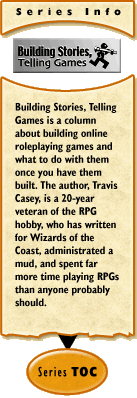
|
Interlude: Metagenres & Stancesby Travis S. Casey I was planning on moving on to comedy as my next genre, but in thinking about it, I realized a couple of things — first, that comedy is a metagenre, which is a concept I've only touched on without explaining; and second, that comedy has a lot to do with stance, which is something else I haven't really talked about yet. So, we're taking another quick break from plowing through the genres to cover metagenres and stances. "Metagenre" is a term I first came across when I was researching the opening column about fantasy genres. A metagenre, the way I saw it being used, is a "genre" that cuts across many other genres. You can think of it as not being so much a genre in itself as it is a modifier to other genres. Take, for example, comedy. Knowing that something is a "comedy", in and of itself, doesn't tell you much — just that it's supposed to be funny. The metagenre of "comedy" is applied to other genres — Terry Pratchett's Discworld is comedy fantasy, Keith Laumer's Retief stories are comedy science fiction, the Lethal Weapon series is comedy buddy cop action (wow, there's a load of genre tags), and so on. I'd go so far as to say that you can't have a comedy that doesn't also belong in some other genre. (Movies may be billed as just "comedies", but what that really means is that it's a comedy version of a "mainstream" movie, which is a genre of its own, IMHO.) Another example is "military". There's military science fiction (Heinlein's Starship Troopers), military fantasy (Glen Cook's Black Company novels), and even military horror (quite a few of the "horror" games for the PC fall into this category). A quick note here — if pressed, I'd have to say that "metagenres" aren't that much different from ordinary "genres" in a lot of ways. You can combine some of the ordinary genres as well — e.g., "horror science fiction", "horror fantasy", "fantasy cops", and so on. I see metagenre as mostly being a useful term to point out how some genres are more easily "mixed in" than others. (In some ways, I think what would really be more meaningful would be a classification of genres into things like period, tone, etc. However, that also strikes me as something that's of more academic interest than practical use.) With metagenres briefly explained, now it's on to stances! Stances in Roleplaying (or, it's not me, it's my character)In the parlance of roleplaying theory, "stance" indicates a combination of point of view and what one can control. This is one of those things where it's easier to give examples than to explain the general concept, so let's start there:
Those four stances are the usual ones talked about in RPG theory. It should be noted that many of the distinctions about them are purely traditional, and there are games that modify who has access to these stances and when. For example, traditional RPGs try to restrict author stance to a "pregame" stage — but an RPG that allows character creation to continue while the game is being played (such as with the "Uncommitted Traits" rule in Fudge) lets the players continue to use author stance during play. As another example, many paper RPGs allow players to have some level of directorial power through a mechanic of "luck points" or something similar. I'd like to add two more stances of my own invention: Game Designer. This is the stance from which rules are created. Changing the game to have a new fatigue system would be an example of something done from game designer stance. This stance can be used during a game, when one improvises a rule for something — at least in theory. In a computer RPG, there's often no way to do anything from game designer stance during a game. Scenario Designer. The scenario designer is much like the director, with the primary difference being that the scenario designer does his/her work before the game. When a GM runs a store-bought scenario for a paper RPG, the person who wrote that scenario was in scenario designer stance. This division can also be useful in computer RPGs where there's a "moderator" or "facilitator" with limited on-the-spot directorial power, but who cannot change the basic scenario. (It may also be a useful division for live-action RPGs). Where do these stances come in with genres... well, I'll talk about that next time, when I hit comedy! See you in 14!
|
